Lubrication Blog
How To Taste Wine Like A Pro
We firmly believe that wine is meant for everyone to enjoy – and with a few tricks up your sleeve, you can start tasting wine and developing your palate like the pro's do! It all starts with the 5 S's of wine tasting...

See
It all starts with the wine in the glass. In the first step of wine tasting, we evaluate the color and opacity of the wine using sight. To evaluate the color of the wine, hold the glass at a slight angle against a white or neutral surface and notice the color range from the core of the glass to the rim. Certain colors, like deep purple, may indicate full-bodied varietals like Syrah or Malbec, while a lighter red core with a pale to clear rim may indicate a lighter variety, such as Pinot Noir or Grenache.
In addition to color, we also look at the opacity of the wine. Traditionally, clear and brilliant wine in the glass can be indicative of a quality wine, however Natural and unfiltered wines do appear cloudy in the glass. Another reason for a cloudy wine is the appearance of sediment that can come from a wine being shaken up too much prior to serving.

Swirl
Before we smell the wine, we should first swirl the wine in the glass. Swirling wine helps introduce oxygen and release aromatic compounds in the wine. If you've never swirled wine, here's a tip: keep the bottom of the wine glass on a hard surface, and gently grip the glass and move your hand in a small circle. After you've practiced this for a while, you'll be able to start swirling your glass in the air freestyle like a champ.
It is in this step that we are able to evaluate the viscosity or legs of the wine. A wine with higher sugar content typically has slower-moving legs, while higher alcohol wines typically yield more droplets or number of legs.

Smell
After swirling the wine to release all the beautiful aromatics, it's time to smell the wine. No, you don't need to stick your nose all the way into the glass, but if that's you're style, do you boo. We find it best to take a series of short sniffs from different angles to allow our brain time to evaluate the information coming in. It's okay if all you smell is grapes – keep trying and the more you practice, the more you'll be able to identify different smells. Keep it simple and think about these three categories:
Primary Aromas: These are derived from the grapes themselves and include, fruit, herbal and floral notes.
Secondary Aromas: These smells come from the winemaking process (from things like yeast) and can smell like bread, nuts or cheese rind.
Tertiary Aromas: These aromas come from the aging process and can include things like baking spices, vanilla, cedar and tobacco.
Don't worry about identifying each and every aromatic. There are no wrong answers – have fun with it!
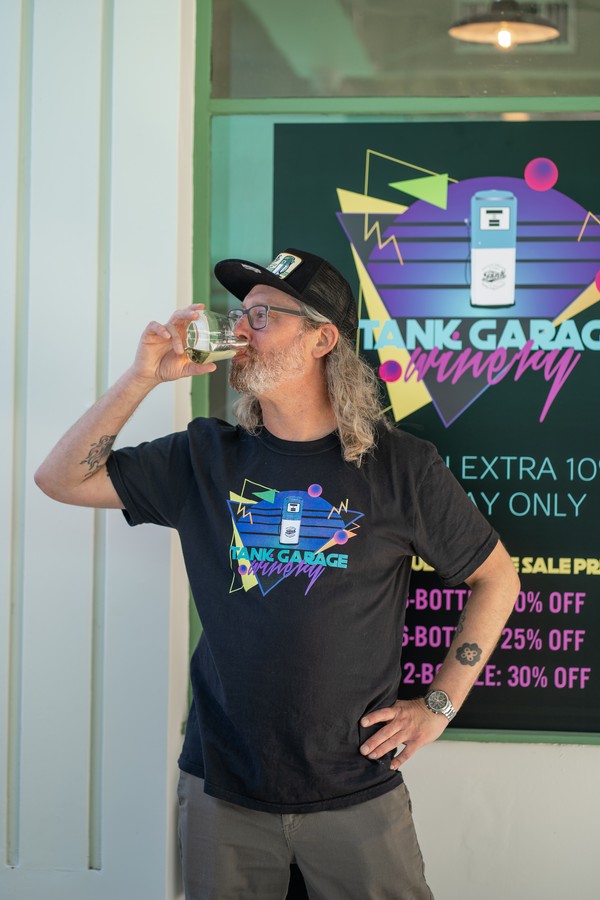
Sip & Savor!
Now, the part you've been waiting for – it's time to taste the wine! Notice how the wine tastes similar or different to the aromatics you smelled in the previous step, and how the wine changes as it moves across your tongue. Does it taste sharp and acidic like lemons, or do you notice your mouth feeling drier than before you took a sip, indicating tannin structure? All of these clues can tell you the type of variety you may be tasting or how the wine was made. While no two wines will taste exactly the same, what you are looking for in this step is balance. If the wine taste like alcohol, if it's too sweet, too sour, etc., then it's not considered a well-balanced wine and will not age well.
Most importantly, what matters is whether or not YOU like the wine. Wine tasting is meant to be fun, and the more you practice, the better you'll get at identifying various tastes and smells. Eventually, as you learn to recognize individual characteristics of grape varieties, you may even begin to be able to identify specific varieties in a blind tasting!
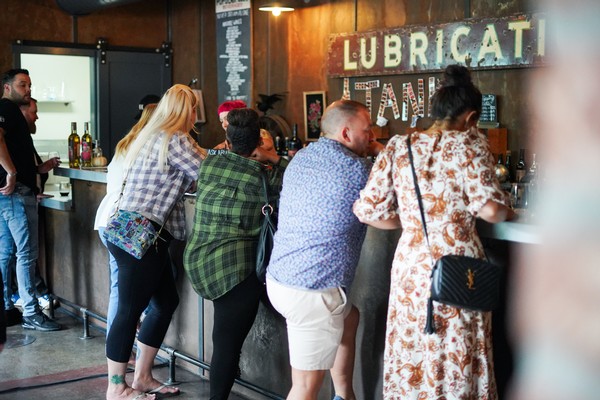
Taste at Tank
Our goal is to make wines that add to the collective conversation. Wines with soul and purpose. By sourcing fruit from California’s most important vineyards, we’re able to create delicious wines that are unlike anything you’ve ever experienced before.
During our fun wine-tasting experience, you’ll taste a variety of unique, one-off wines inside our vintage gas station and garage. Each wine is a limited-edition blend created from unique varieties picked from California’s most interesting and important vineyard locations and partners. Blends include red wine, white wine, sparkling pét-nat, orange wine, rosé, and natural wine. Regardless of the occasion, we have a bunch of unique experiences for you and your whole squad. Can't make it to Napa Valley? We have Virtual Tasting options too!
Let's Get Cozy with Mulled Wine
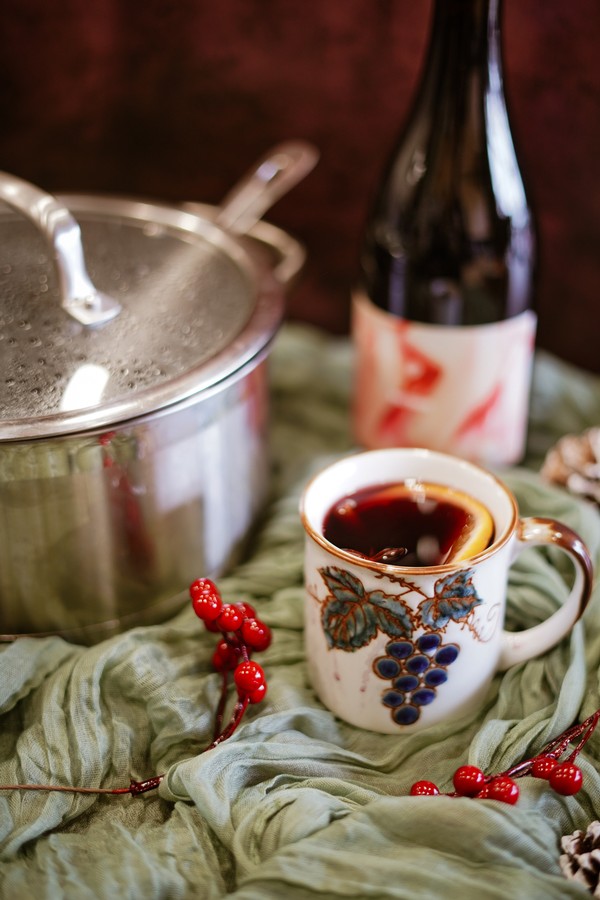
There's just something about sipping a warm drink in front of the fire that brings out all the holiday cheer. Our libation of choice? Mulled wine – a red wine concoction packed with warming spices and seasonal fruit that is oh-so delicious and easy to make.
Known by many names across cultures and dating back to Roman times, Mulled wine is an amazing holiday sipper and is perfect for serving a crowd. This delectable drink comes together within minutes and can be customized with your favorite spices and liqueurs.
Mulled Wine Ingredients
for this recipe you'll need:
Wine: We used Softcore for our version, but you can use any bottle of dry red wine. We recommend something that is fruit-forward and medium to full-bodied. Think varieties like Zinfandel, Grenache, Merlot or Syrah.
Liqueur: Traditionally, Brandy is used to spike your mulled wine. If that's not your style, try an orange or raspberry liqueur or even a tawny port.
Fresh citrus: Oranges add an amazing amount of flavor to mulled wine and make a beautiful garnish. Since it's peak citrus season, we included a mix of blood oranges, Valencia, and Cara Cara oranges. Note – oranges that are simmered with the wine should have the peel and pith removed to avoid bitterness.
Mulling spices: Mulling spices can vary depending on location, but we love a mixture of cinnamon sticks, whole cloves, star anise, cardamom, peppercorns and allspice. While you can find store-bought mulling mixes, we highly recommend making your own mix. These spices can also be simmered with apple cider for another spectacular holiday drink.
Sweetener: Sweetened to taste, mulled wine can be made with sugar, honey, maple syrup, or your preferred sweetener.
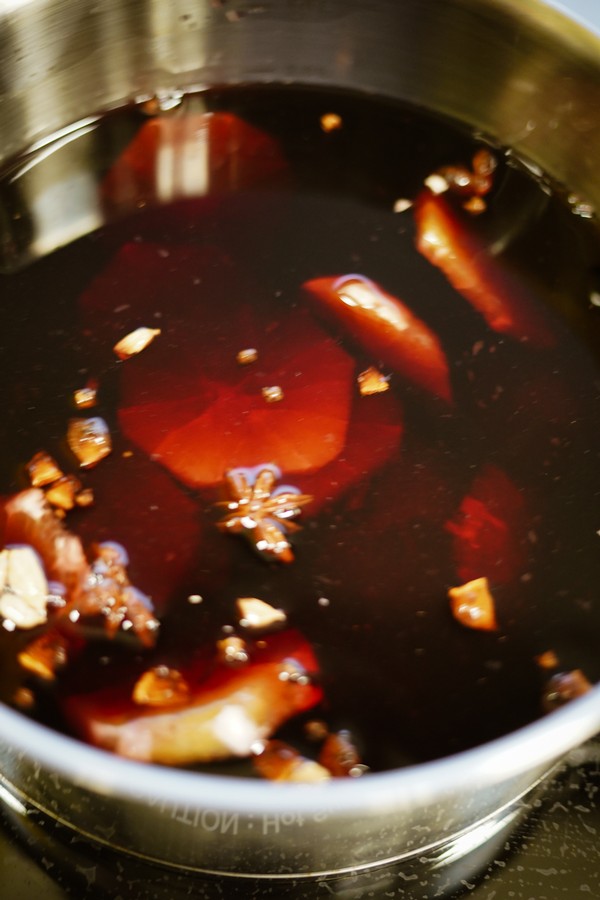
How To Make Mulled Wine:
Making this seasonal sipper is as easy as…
Combine ingredients: Combine all ingredients in a large pot (for a hands-off version, try using a crockpot!)
Simmer: Over medium heat, bring wine to a simmer (about 170°F), and do not boil. Reduce heat to low, cover completely, and let the wine simmer for at least 15 minutes and up to several hours. Avoid over-cooking your batch, as it will create a raisin-like flavor and syrupy consistency.
Strain and season: Using a fine mesh strainer, strain the liquid to remove any citrus and mulling spices. Give the mulled wine a taste, and sweeten as needed.
Serve: Serve warm and top with sliced orange peel, cinnamon sticks or your favorite seasonal garnish!
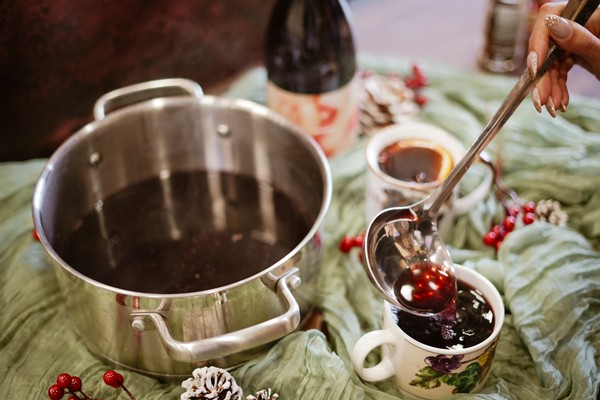
Mulled Wine
Serves 4
Ingredients:
1 (750 mL) bottle Red Wine
1/4 c liqueur of choice
1 orange
2 cinnamon sticks
2 star anise
2 cardamom pods
8 whole cloves
3 allspice berries
3 peppercorns
about 1/4 c maple syrup or preferred sweetener
for the garnish (optional):
orange slices, star anise, cinnamon stick
Method:
Combine ingredients: Combine all ingredients in a large pot (for a hands-off version, try using a crockpot!)
Simmer: Over medium heat, bring wine to a simmer (about 170°F), and do not boil. Reduce heat to low, cover completely, and let the wine simmer for at least 15 minutes and up to several hours. Avoid over-cooking your batch, as it will create a raisin-like flavor and syrupy consistency.
Strain and season: Using a fine mesh strainer, strain the liquid to remove any citrus and mulling spices. Give the mulled wine a taste, and sweeten as needed.
Serve: Serve warm and top with sliced orange peel, cinnamon sticks or your favorite seasonal garnish!